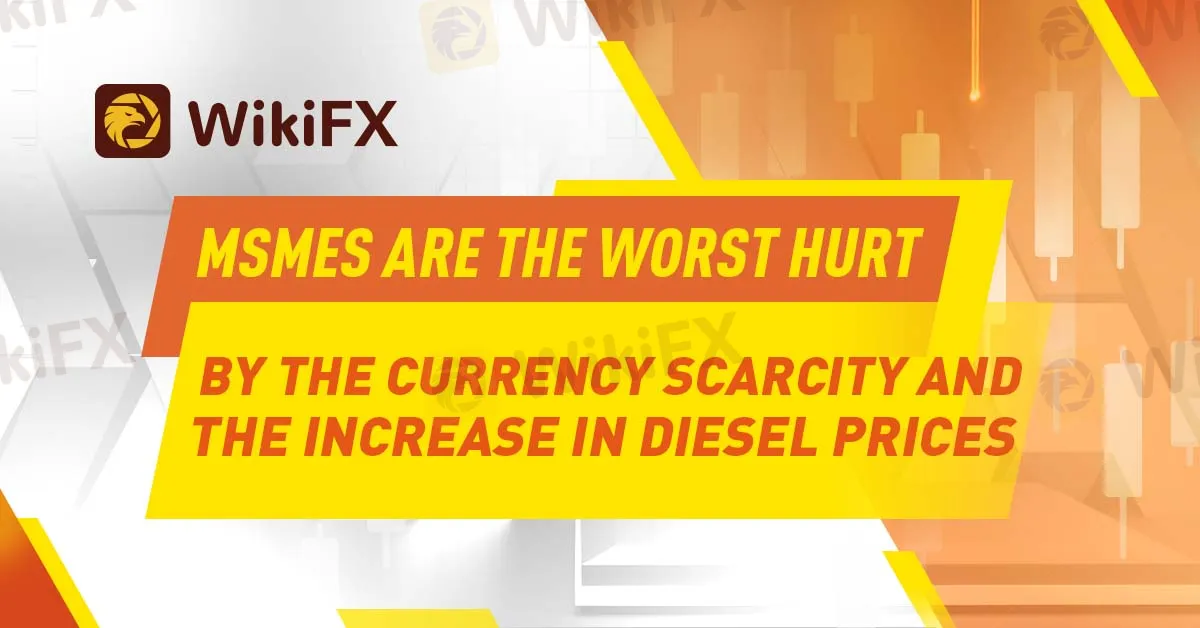简体中文
繁體中文
English
Pусский
日本語
ภาษาไทย
Tiếng Việt
Bahasa Indonesia
Español
हिन्दी
Filippiiniläinen
Français
Deutsch
Português
Türkçe
한국어
العربية
MSMES ARE THE WORST HURT BY THE CURRENCY SCARCITY AND THE INCREASE IN DIESEL PRICES
Abstract:According to Dr. Femi Egbesola, National President of the Association of Small Business Owners of Nigeria, the country's micro, small, and medium firms are being impacted the hardest by the present dollar scarcity and high diesel costs.

According to Dr. Femi Egbesola, National President of the Association of Small Business Owners of Nigeria, the country's micro, small, and medium firms are being impacted the hardest by the present dollar scarcity and high diesel costs.
While the Central Bank of Nigeria made it simpler for major enterprises to get dollars from commercial banks, he claims that MSMEs frequently struggle and are forced to rely on the parallel market.
The country has been suffering from a serious dollar shortage, which has been compounded by the instability often associated with elections and indirect primaries, when politicians scavenge cash from the black market and commercial institutions.
According to statistics on the CBN's website as of Friday, the official rate remained at N415.87 per dollar, but as of Thursday evening, a dollar swapped for between N600 and N610 in the parallel market.
Despite analysts' worries that the arbitrage was unsustainable and fostered corruption, the naira has continued to depreciate in the parallel market versus the dollar, while the Importers and Exporters window rate has stayed relatively steady.
“Micro and small enterprises are the worst hurt by the dollar shortage and high cost of diesel,” Egbesola told our correspondent over the phone recently. We lack the financial resources available to medium and big firms to mitigate the damage.
“Because of how the CBN constructed it, medium and big enterprises find it simpler to receive dollars from banks, leaving us with little alternative except to rely on the illicit market for currency.” As a result, we have the highest prevalence. We know we're up against a huge obstacle when we compete in the same market with medium and large-scale firms that obtain it at a cheaper cost.
In response to the high cost of diesel, he claimed that due to production costs, many things imported into the country were cheaper than those created domestically. “That is why some of our members are closing their doors, not only ceasing production, but also seeking for alternate means of revenue,” he stated. Approximately 15 to 18% of our members have closed their doors or are facing financial problems. Because energy supply is unreliable and we can only buy limited amounts at a time, we rely increasingly on fuel. We cannot be compared to larger corporations that can purchase fuel tankers in bulk. They can acquire it cheaper and even on credit, with the opportunity to pay in installments or at a later date.
He asked the government to focus more on SMEs, which he described as the development engine.
“The government cannot generate employment; we must,” he said. So, how can we generate jobs when we can't even make a living, let alone a profit? Currently, manufacturing and small enterprises are shutting, resulting in employment losses. It isn't right.
“Some of our members are migrating to neighboring countries because their power and currencies are reliable, and their regulations favor small enterprises.”
According to a joint study issued in January by the National Bureau of Statistics and the Nigerian Small and Medium Enterprises Development Agency, Nigeria has 39,654,385 MSMEs as of December 2020, a decrease from 41,543,028 in 2017. They contributed 4.5 percent of the country's GDP, according to the report.
According to Egbesola, ASBON has over 23,000 members in 27 states across the country.
“The CBN and SMEDAN defined small companies as enterprises with operating capital, not assets, ranging from N5 million to N50 million, while N5 million and lower is deemed a micro-enterprise,” he went on to say.
“If you have 30 or less people, you're called a small firm; if you have more than 30, you're labeled a medium or large corporation.” So the two indexes are working capital and workers.

Disclaimer:
The views in this article only represent the author's personal views, and do not constitute investment advice on this platform. This platform does not guarantee the accuracy, completeness and timeliness of the information in the article, and will not be liable for any loss caused by the use of or reliance on the information in the article.
Read more

Italian Regulator Warns Against 5 Websites
The Italian regulator, CONSOB has issued a warning against five websites offering unauthorized financial services. This regulatory action aims to protect the public from fraudulent activities.

Trader Exposes Unethical Practices by STP Trading
A recent allegation against STP Trading has cast doubt on the firm's business practices, highlighting the potential risks faced by retail traders in an increasingly crowded and competitive market.

What Makes Cross-Border Payments Easier Than Ever?
Cross-border payments are now faster, cheaper, and simpler! Explore fintech, blockchain, and smart solutions to overcome costs, delays, and global payment hurdles.

FCA Identifies Clone Firm Exploiting Admiral Markets' Credibility
The UK Financial Conduct Authority (FCA) has issued a public warning regarding a fraudulent entity impersonating Admiral Markets, a legitimate and authorised trading firm. The clone firm, operating under the name Admiral EU Brokers and the domain Admiraleubrokerz.com, has been falsely presenting itself as an FCA-authorised business.
WikiFX Broker
Latest News
Hackers Charged for $11M Crypto Theft Using SIM-Swaps
Role of Central Banks in the FX Market
FCA Alerts Against Sydney FX
What Makes Cross-Border Payments Easier Than Ever?
Trader Exposes Unethical Practices by STP Trading
Malaysian Man Loses RM113,000 in Foreign Currency Investment Scam
Bitcoin Nears $100,000: A Triumph of Optimism or a Warning Sign?
Mastercard Partners with JPMorgan for B2B Cross-Border Payments
FCA Identifies Clone Firm Exploiting Admiral Markets' Credibility
Coinbase Under Scrutiny Amid Wrapped Bitcoin Delisting Controversy
Currency Calculator


